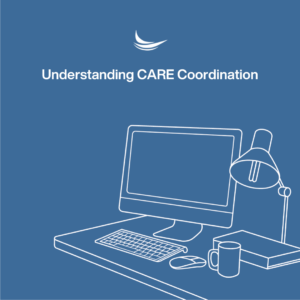Understanding CARE Coordination
 Care coordination is defined by the Agency for Healthcare Research and Quality (AHRQ) as “deliberately organizing patient care activities and sharing information among all of the participants concerned with a patient’s care to achieve safer and more effective care. Care coordination is an important aspect of your treatment; understanding this service can help ensure you receive the best care possible.
Care coordination is defined by the Agency for Healthcare Research and Quality (AHRQ) as “deliberately organizing patient care activities and sharing information among all of the participants concerned with a patient’s care to achieve safer and more effective care. Care coordination is an important aspect of your treatment; understanding this service can help ensure you receive the best care possible.
Care coordination informs you of privacy practices.
When you receive medical or mental health services, your provider will give you notice about how they may use and share your health information, as part of the HIPAA Notice for Privacy Practices. Please be sure that you read this and ask your provider if you have any questions.
Care coordination involves your written consent.
Your medical records are protected health information (except in specific circumstances such as mandated reporting for maltreatment) and therefore require the patient’s written authorization before sharing or obtaining records with others involved in your care. “Individually identifiable health information” related to physical or medical health conditions, such as reasons for seeking treatment, diagnosis(es), summaries of treatment, list of any prescribed medications, results of psychological testing, treatment plans, and recommendations requires a signed release of information as part of care coordination. For minors, written consent and authorizations are given by the child’s parent or legal guardian.
Care coordination helps to plan your care and treatment.
When seeking new mental health or medical treatment, it is helpful for your provider to understand the most recent care you have or are receiving. For the patient, it is equally important to understand why you are being referred and to understand the services that you will be receiving. If you have been admitted to the hospital for mental health reasons within the last two years, completed treatment such as residential or intensive outpatient services, received psychological testing, are prescribed medication, or experienced a chronic mental health or medical condition, it is recommended to coordinate care, by reviewing past services to assist with future planning.
Care coordination is considered a best practice.
Having more than one provider takes a team approach and communication among providers. Your team may include your primary care physician and your therapist. Perhaps there are others such as a psychiatrist, family therapist, or case manager. Care coordination is considered essential when there are more complex needs, and more people are involved in your care. Care coordination at a very basic level may include faxing over a signed release of information that notifies a provider that you are receiving therapy. For a young adult on their parent’s insurance plan, it may be a general release to communicate for billing purposes only. The patient chooses how much information they feel comfortable sharing and who (if anyone) they choose to share this with.
Care coordination may involve a professional helper focused solely on this role.
People who experience severe and persistent mental illness, those with neurodevelopmental disabilities, people who are involved with systems such as child protection or probation, and individuals who require a higher level of care to help stabilize symptoms often require more time-intensive care coordination. Connecting to the appropriate support such as Children’s Mental Health Case Management, Adult Rehabilitative Mental Health Services (ARMHS), or similar services may be recommended. Sometimes a family member may take on this role. Feel free to ask about other services that may be available.
Coordination of care helps with evaluating the effectiveness of treatment.
Effectiveness of care is important and care coordination increases the likelihood of effective treatment due to improved communication, teamwork, and sharing of resources. Some things that may be evaluated with care coordination include significant improvement or decline in mental health or medical symptoms. This also includes the effectiveness of medications and therapeutic interventions. Alternatives may be recommended, depending on the responses. Coordination of care will also help with the continuity of care. Ultimately, your safety always comes first and foremost; care coordination not only helps ensure safety but also works to connect you with effective treatment.
Written By: Charlotte Johnson, MA, LPCC



























